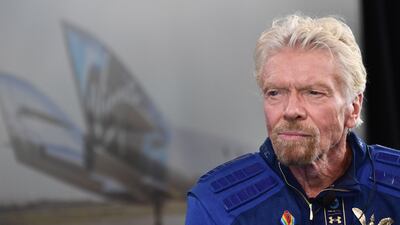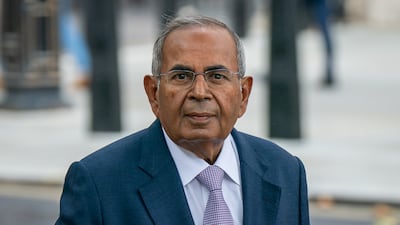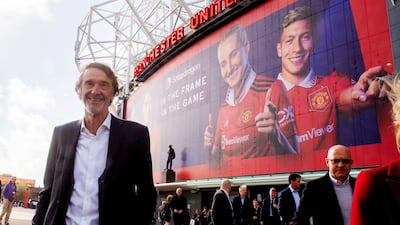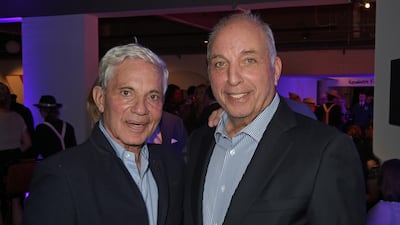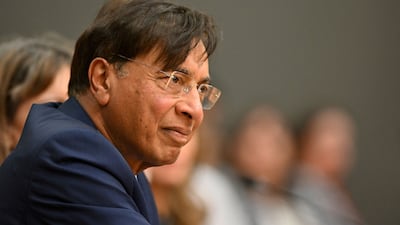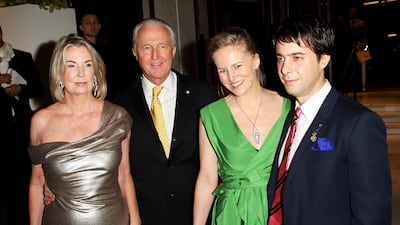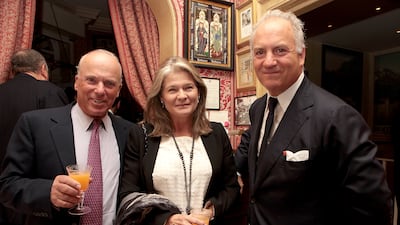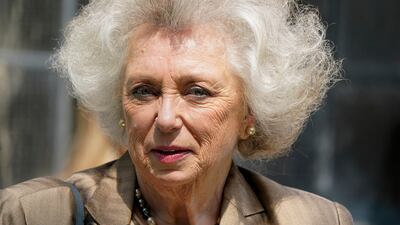Entrepreneur Sir Richard Branson and British Prime Minister Rishi Sunak watched their fortunes plummet in the past year, according to this year’s Sunday Times Rich List.
The 2023 index, released on Friday, is topped by Gopi Hinduja and his family, who have an estimated record fortune of £35 billion ($43.5 billion).
Chemicals billionaire Sir Jim Ratcliffe was catapulted into second place.
Sir Jim, who is trying to buy Manchester United, had more than £23.6 billion added to his wealth because of “new information about his finances”, rather than a change in his financial position, the list's compilers said.
But there were also big losers.
Sir Richard’s wealth shrunk more than 40 per cent, by £1.79 billion, in a year after his Virgin Group suffered big losses during the pandemic.
And the personal fortune of Mr Sunak and his wife, Akshata Murty, fell by more than £200 million over the past year as the value of her stake in her father's company fell. They are at 275 on this year's list.
These are the 10 richest people and families in the UK, according to the Rich List:
- Gopi Hinduja and family – £35 billion
- Sir Jim Ratcliffe – £29.7 billion
- Sir Leonard Blavatnik – £28.6 billion
- David and Simon Reuben and family – £24.4 billion
- Sir James Dyson and family – £23 billion
- Lakshmi Mittal and family – £16 billion
- Guy, George, Alannah and Galen Weston and family – £14.5 billion
- Charlene de Carvalho-Heineken and Michel de Carvalho – £13.1 billion
- Kirsten and Jorn Rausing – £12 billion
- Michael Platt – £11.5 billion
The decline in Sir Richard’s wealth is a greater fall in his net worth than the tycoon indicated during an interview with the BBC earlier this month. He is 77th in this year's list.
He told the BBC's Amol Rajan that the pandemic “cost us a big percentage of our net worth, maybe £1.5 billion”.
He added: “There was a time where it really looked like we were going to lose everything.”
The Sunday Times said last year that Sir Richard and his family were worth about £4.2 billion, placing him 44th on the list.
The businessman, who lives on a private island in the Caribbean, was 77th on the list this year, with a net worth of £2.41 billion.
Virgin Group, which includes airline Virgin Atlantic, gym group Virgin Active and bank Virgin Money, suffered when Covid struck in early 2020.
Sir Richard faced criticism when he asked for a commercial loan from the government at the height of the virus in an attempt to keep his airline afloat.
UK rich list 2023 - in pictures
He insisted he did not have billions in “cash in a bank account ready to withdraw” to save the business and tens of thousands of staff.
Virgin Atlantic eventually secured a £1.2 billion bail-out involving only private funds, including £200 million from the wider Virgin Group.
The troubles continued for his empire, with Virgin Orbit filing for bankruptcy earlier this month and cutting 675 jobs – about 85 per cent of its workforce.
It came after a rocket failed to complete the first satellite launch from UK soil in January.
Mr Sunak and his wife’s wealth is estimated at about £529 million in this year’s Rich List, a fall from £730 million a year earlier.
Ms Murty owns a small stake in Infosys, a $64 billion (£52 billion) Indian IT company co-founded by her billionaire father.
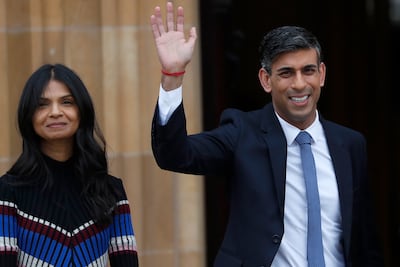
Her stake is less than 1 per cent of the business, but the company shares have lost about a fifth of their value in the past year as investors worried about the future of the Indian technology sector.
The couple first appeared on the list last year when Mr Sunak was chancellor in Boris Johnson's government.
When he was running to be prime minister, Mr Sunak's standing was dented by scrutiny of his family's financial affairs and large wealth.
There were 171 billionaires in the UK this year, six fewer than last year, but their combined wealth has risen by £30.7 billion to £683.9 billion.
Robert Watts, the list's compiler, said: “This year's Sunday Times Rich List shows a golden period for the super-rich is over. For the first time in 14 years we've seen the number of UK billionaires fall.
“Two years ago we raised concerns about an unsettling boom in the fortunes of the very wealthy that continued unchecked during the political instability around Brexit and the pandemic.
“This is not a crash, but there are household names who have lost vast sums over the past year.
“The bursting of the tech bubble, the end of rock-bottom interest rates and the jitters creeping through the banking industry have all taken their toll.
“The super-rich don't exist in a vacuum. Many small investors lost money in some of their overblown stock market floats.
“Many people also work for their businesses. Financial losses for billionaires can have implications for us all.”
Who are the UK's top five wealthiest people?
Gopi Hinduja
An Indian-born businessman, Mr Hinduja is co-chairman of the Hinduja Group, which is involved in 11 sectors, including banking and finances; health care; and oil.
The company was founded in 1914 in India. It was until recently run by four Hinduja brothers, now three after the death this week of Srichand Hinduja, who was 87.
It employs more than 200,000 people around the world.
Gopi and Srichand moved to the UK from Iran, Hinduja Group’s previous headquarters, to develop its export business in 1979.
Sir James Ratcliffe
Sir James Ratcliffe, a British billionaire, chemical engineer and businessman, is the chairman and chief executive of the Ineos Chemicals Group. He founded the company in 1998.
He had a modest upbringing and lived in a council house until the age of 10. His first job was with the oil company Esso.
Once described as “publicity shy” by The Sunday Times, Sir James likes to keep a low profile. In 2020, he changed his tax residence from the UK to Monaco, saving him about £4 billion in tax. He splits his time between Hampshire and Monaco.
Sir Leonard Blavatnik
Born in Ukraine, Sir Leonard spent part of his childhood in Yaroslavl, a city near Moscow, before moving to the US.
He made his fortune after the collapse of the Soviet Union via the privatisation of aluminium and oil assets. He currently owns most of the Warner Music Group.
Last year, a representative for Sir Leonard issued a statement to say his personal and commercial activities “are not, and have never been, involved with Putin, Russian politics, or the Russian government.
“Sir Leonard and the Blavatnik Family Foundation believe that what is happening in Ukraine is heartbreaking and he condemns the ongoing violence. Along with all fellow American and British citizens, Sir Leonard hopes and prays that the conflict ends quickly and that peace returns to Ukraine.”
David and Simon Reuben
The brothers are Indian-born British businessmen with Baghdadi Jewish heritage. They both attended state school in north London. Simon never formally completed his education.
They made their initial fortune investing in the Russian metals market in the 1990s, but had sold all Russian assets by 2000 and now focus mainly on the UK property market.
Their properties include Millbank Tower; the John Lewis Partnership headquarters in Victoria; the American Express offices, also in Victoria; Carlton House SW1 and the London Primark store on Oxford Street, among many others.
Sir James Dyson
British inventor and businessman Sir James made his name designing vacuum cleaners, but his first invention was a wheelbarrow that used a ball instead of a wheel that was featured on the BBC's Tomorrow's World TV show.
He launched his first bagless vacuum cleaner in 1983 in Japan via catalogue sales, because no manufacturer or distributor would sell it in the UK. He later set up his own manufacturing company and research centre in the UK.
In an interview with Fast Company, he once said: "I made 5,127 prototypes of my vacuum before I got it right. There were 5,126 failures. But I learnt from each one. That's how I came up with a solution. So I don't mind failure. I've always thought that schoolchildren should be marked by the number of failures they've had."
